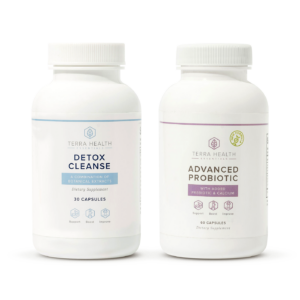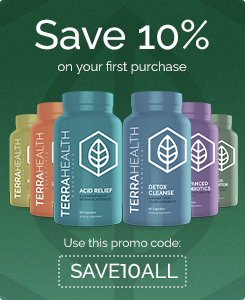Almost everyone you ask will have experienced stomach discomfort at some point. From cramping to more chronic issues such as IBS, digestive problems are becoming increasingly common. However, the solution for better digestion isn’t always simple and the process of figuring out the root cause and best treatment for your symptoms can often feel incredibly frustrating.
Many people become so disheartened in their quest for a solution that they simply adapt to living with digestive dysfunction, and this just isn’t good enough. No-one should have to live in constant discomfort when it’s completely unnecessary.
Whether your gut issues are due to a serious illness such as Crohn’s or a “minor” food sensitivity, the symptoms can often be comparable in terms of severity, and many patients who fall into the “minor” group often feel let down by the level of treatment and empathy they receive from medical practitioners.
As a result, they turn to natural solutions and try to formulate a more holistic plan to help them to take control of their digestive health and wellness without prescriptive medication.
In this post, you’ll find some completely natural methods you can try out to improve your digestion, whether you’re brand new to this or wish to incorporate them into your existing plan. While you’re here, please also have a look through our previous posts where you’ll find lots of information on how to deal with digestive issues such as bloating and insomnia.
 1. Combating Constipation
1. Combating Constipation
It’s likely that you’ve experienced this issue at some point in your life, but if constipation has become a regular occurrence (or should we say “irregular”?!) then it’s time to figure out what’s going on and take action. Constipation is usually a result of a buildup of waste in your intestines which causes it to ferment and produce gas. If this gas builds up, your tummy will harden and become painful – often extremely so.
There are many factors that can be linked to the onset of constipation but the most common are medication side effects (painkillers are a big one here), dehydration, stress, anxiety, food sensitivities (IBS-C), and a sedentary lifestyle. A lack of sleep is also a contributing factor as this encourages your body to release cortisol – a stress hormone that can cause an array of issues if your body becomes overloaded with it. One such issue being constipation.
Avoiding these trigger factors is the best way to deal with constipation, in addition to perhaps supplementing your diet with a detox cleanse to clear out your colon and digestive enzymes to help your body with the food it finds tough to break down.
2. Dealing with Diarrhea
Diarrhea can be caused by various food allergies and intolerances (e.g. lactose intolerance), medications, and conditions such as IBS-D, inflammatory bowel disease, Crohn’s, and ulcerative colitis.
Similarly to dealing with constipation, your first port of call in naturally treating diarrhea should be to remove any possible trigger foods from your diet and consider following the FODMAP elimination protocol to do so if necessary. FODMAP is a process of removing IBS trigger foods from your diet completely and then slowly reintroducing them to assess what your body can and cannot tolerate.
3. Beating Bloating
Persistent bloating, cramps, and flatulence can again be indicators of anything as “minor” as a food intolerance to an illness such as IBS or general infection. The FODMAP should be your first port of all in this regard to rule out diet as the issue, in addition to adding supplements to your diet to assist with the breakdown of foods.
Staying hydrated is also vital in order to prevent low blood pressure and dehydration which can cause your body to retain excess water, and mindful eating is important to ensure that you don’t swallow air by eating too quickly.
You can read more about how to prevent bloating in our list of foods to avoid if you suffer from bloating.
4. Power of Probiotics
Probiotics are the good bacteria that your digestive system needs to thrive. They hang out in your intestines where they aid digestion, help to reduce chronic inflammation, prevent infection, and make a significant contribution to the health of your gut flora. It’s essential to take a probiotic whilst on antibiotics to maintain the good bacteria levels in your gut.
However, adding a probiotic to your diet is a good idea regardless; as they will help to reduce bloating issues and flatulence, alleviate stomach discomfort in general, boost your immune system, and heal your gut lining.
5. Increase your Stomach Acid
You probably think that’s a typo, right? Increase your stomach acid? But this is actually one of the best ways to improve your digestive health. Issues such as heartburn are often linked to high levels of stomach acid, but the reality is that too little stomach acid is often the case.
Adding some freshly squeezed lemon juice to your water a few times a day and drinking a teaspoon of apple cider vinegar before each meal can naturally increase your stomach acid.
 Get Started With Now With a Complete Gut Reset!
Get Started With Now With a Complete Gut Reset!
Our Gut Reset Kit contains a special combination of our Advanced Probiotic and Detox Cleanse supplements to give your gut a complete system overhaul! This kit will detoxify your colon and restore optimal gut functioning so that you can get your digestive system functioning as it should again.
We’re giving our loyal blog readers a special 30% discount on this expertly formulated Gut Reset Kit by using the code: tummytrouble30 when you place your order.
Don’t forget to follow us on Facebook where you can contact us anytime with questions or a customized treatment plan!


